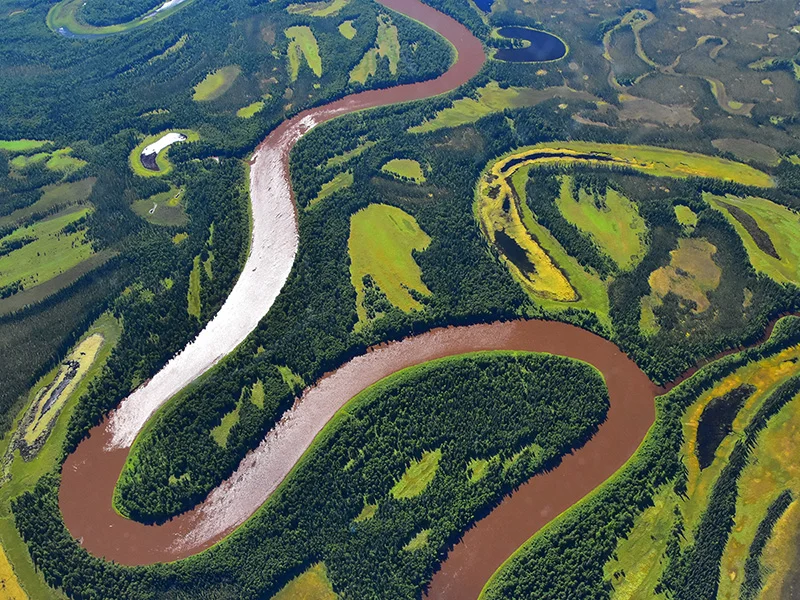‘We Have No Other Home’: Alaska Tribes Sue to Stop Largest Pure Gold Mine

 Why you can trust us
Why you can trust us
Founded in 2005 as an Ohio-based environmental newspaper, EcoWatch is a digital platform dedicated to publishing quality, science-based content on environmental issues, causes, and solutions.
If the Donlin Gold Mine is built as planned in Southwest Alaska, it would be the largest pure gold mine in the world. It would also lead to the filling of thousands of acres of wetlands, harm salmon and rainbow smelt and risk a catastrophic spill of 20 to 40 percent of the up to 568 million tons of toxic waste that could end up stored behind a 471-foot tailings dam.
That’s why three Indigenous Tribes filed a lawsuit Wednesday to block the project, arguing that it threatens the Kuskokwim River ecosystem that they have relied on “since time immemorial.”
“We’ve been on this land for almost 10,000 years. What will happen if a tailings spill occurs?” Orutsararmiut Native Council Executive Director Brian Henry said in a statement emailed to EcoWatch. “We all know the answer. It would be catastrophic to our people and our way of life. We have no other home.”
The Orutsararmiut Native Council filed the lawsuit alongside the Tuluksak Native Community and the Organized Village of Kwethluk in the U.S. District Court in Alaska, with Earthjustice acting as the Tribes’ representatives. In particular, the Tribes want the court to invalidate the major permits for the project, the Orutsararmiut Native Council explained in a statement. These are the 2018 Final Environmental Impact Statement (FEIS); the Joint Record of Decision in favor of the project from the U.S. Army Corps of Engineers, the Bureau of Land Management (BLM) and the Department of the Interior (DOI); the Army Corps approval to fill thousands of acres of wetlands for the project–which the lawsuit says would drain water from salmon-bearing streams–and a BLM and DOI permit for a natural gas pipeline that would run for 316 miles from Cook Inlet to the mine to act as a power source.
The lawsuit claims these approvals have three major flaws:
- The FEIS did not fully release the findings of an Alaska assessment of the health impacts of the mine.
- It did not consider the impact of a full tailings spill, only a spill involving less than one percent of a potential tailings dam’s capacity.
- The Army Corps didn’t consider how increased barge traffic on the river would harm rainbow smelt, an important food source both for the Tribes and for salmon.
“Because of flawed studies that failed to thoroughly consider the environmental and subsistence impacts of the mine, the U.S. Army Corps of Engineers has issued an illegal permit and BLM and the U.S. Department of the Interior have authorized an illegal right-of-way,” Earthjustice Senior Attorney Maile Tavepholjalern said in a statement emailed to EcoWatch. “The Corps also failed to prevent predicted impacts to Kuskokwim River rainbow smelt, an important subsistence and prey fish. This lawsuit seeks to overturn those authorizations, which would halt the mine. Before it moves forward again, federal agencies would need to conduct a more honest assessment of the mine’s impacts and identify and require measures to protect smelt.”
In response, the mine, which is owned by NovaGold and Barrick Gold Corporation, defended its plans and said the proposed mine is located on land that was earmarked for mining 50 years ago.
“The Donlin Gold stakeholders fully believe that this lawsuit is without merit and are confident that the actual record will once again fully support the agencies’ decisions,” the company said in a statement reported by Anchorage Daily News. “In the meantime, the Donlin Gold team and the owners continue to advance remaining state permitting, as well as drilling and technical work, subject to Donlin Gold LLC board approval.”
However, the mine, which contains 39 million ounces of gold that would be extracted over 27 years, will have to contend with a groundswell of popular opposition behind the lawsuit. While the mine has gotten less attention nationally than the recently defeated Pebble Mine, it is opposed by 35 Tribes from the Yukon-Kuskokwim Delta. What’s more, a 2021 Orutsararmiut Native Council survey of more than 300 tribal members found that most of them did not want the mine. The group Protect the Kuskokwim / No Donlin Gold has mobilized to stop it.
“We are salmon people,” Organized Village of Kwethluk President Boris Epchook said in a statement. “Our people’s health is affected when we don’t have access to the customary foods we eat every day. We have a responsibility to protect our ancestral homelands and the air, water, fish and wildlife within them so future descendants can enjoy them and thrive.”
Subscribe to get exclusive updates in our daily newsletter!
By signing up, you agree to the Terms of Use and Privacy Policy & to receive electronic communications from EcoWatch Media Group, which may include marketing promotions, advertisements and sponsored content.

 233k
233k  41k
41k  Subscribe
Subscribe 




